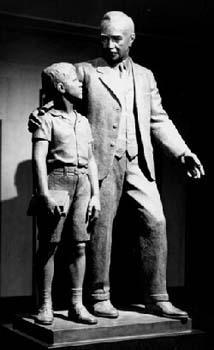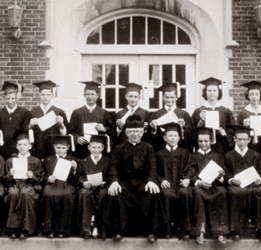 |
Formation of Children
A Youth's Relations with His Superiors
Marian T. Horvat, Ph.D.
This new chapter of the Small Manual of Civility sets out important principles of authority. When a parent sends a child to school, he is delegating his natural authority to the teacher. In effect, he tells his son, respect and obey your teacher as you would respect and obey me. In times past, when parents sent their son to a Catholic school, he could assume that his child would be formed according to sound principles and learn virtues well as reading and math.
Since Vatican II, this is no longer the case. Often, the Catholic schools are breeding grounds for social activism; instead of the Catholic Catechism, students have Comparative Religion classes to learn tolerance for all religions. The sex education classes also can be more explicit and vulgar than those in public schools, where at least the parents still retain the option to have their child “opt out” of them.
It is important for parents to inspect not only the course material their children will learn, but also know about the morals and character of the teachers. Entrusting a child to the authority of a teacher sends the implicit message to the child that he can trust and admire that person. If the teacher’s values and thinking are different from the parents, this can create conflict in the child and in the home. One can easily understand why so many Catholic parents today have resorted to home-schooling or alternative Catholic schools that use the Baltimore Catechism and demand a proper respect for authority. Thus the parental authority is affirmed and strengthened, instead of contradicted and weakened.
The teacher
Paternal power and their prerogatives are in part transferred to other persons: it is what constitutes the right of tutelage.

The child is entrusted to a teacher
as a second father |
The tutor is, therefore, according to the etymology of the Latin word tutela, the guardian, the one who protects, who is charged by the parents to take care of their child. When a teacher is inspired by the principles of the Catholic faith and reason, the student should consider him a delegate of his parents, and therefore, a representative of God. Therefore, the student owes him respect, submission and love, as to a second father.
The student should give teachers the demonstrations of respect that they deserve, greeting them when they meet them, removing their hats in their presence, standing when they enter the classroom, and always addressing them by their titles: Prof. Jones, Dr. Kingston, or Mr. Phillips. In responding to questions, one should answer clearly and distinctly, “Yes, sir” and “No, sir.” He should have much confidence in his superiors, without an excessive familiarity.
Listen well to their corrections and when necessary, humbly receive the punishments they administer for your faults, without showing anger or resentment. At the end of the punishment, it is advisable to thank the superior. This act denotes honor and a sense of duty, since the student acknowledges that the teacher was making a correction of his defects for his own good.
When the student is questioned by a superior about the action of some colleague, he should respond with simplicity and frankness, principally if it is a matter of preventing or remedying some evil. Silence in such a case would harm the companion instead of help him. Let the youth give the requested information staying within the limit of the question and without elaboration or so that he does not fall into the bad habits of intrigues and gossip.

Above, the priest-teacher and his different classes at St. John's Croatian School in Kansas City, 1950 |
Without being subservient, the young man should always be grateful to his superiors. Gratitude is a precious garment that makes a youth agreeable to all. Those who practice it attract to themselves the gifts of Providence. The noble young man can forget the benefits that another owes him, but he never forgets those he has received. He should avoid the company of those who speak against superiors. It is a sign of a bad character and a complete lack of gratitude.
When the educator is a priest or religious, he adds to his authority the fact of being a representative of the Church of Christ, which makes him an ambassador to the youth, according to the order received from the Divine Master, “Go and teach all nations.”
Quintilian on the good student
Quintilian, the famous Roman teacher who opened a school of rhetoric in the 1st century gave this advice to students:
“Students should not love their masters less than their studies; they should consider their teachers as their spiritual parents.
“This pious conviction will assist their progress, because they will listen with docility, believe in the truths taught, and desire to become like their masters. Students should have a joyful and tranquil spirit. When they are corrected, they should not become angry. When praised, they should not become conceited or puffed up in order to conserve their zeal for study. “Just as it is the duty of the master to teach, it is the duty of the students to show docility in learning. One thing without the other will not give a good result”. (De Institutione Or. II, 2).
Religious superiors
At the apex of the religious hierarchy, we have the Supreme Pontiff, the Vicar of Jesus Christ, to whom all power on heaven and earth was given. Below him are the Bishops and parish priests, the pastors of our souls. By the sacred character with which they are invested, they should be venerated, respected and loved. An offense directed against them would be doubly grave. God chastises those who show contempt to his faithful ministers.

The Children's Blessing by Jakob Dielmann |
One should make the first greeting to every ecclesiastic you meet, even if you do not know him by name, because the greeting honors his character as priest and the religious habit that represents the Church of Jesus Christ. Every well-bred man will cede the right of way and best place to a priest as a sign of proper respect.
Greeting a Bishop, one should kiss his ring; in receiving his blessing he should drop on one knee before him, not just because of the grandeur of his Episcopal character, but also because of the relic of the Holy Cross that Bishops usually wear inside their pectoral cross. Good Catholic youth should often ask the blessing of priests or Bishops.
When an ecclesiastic visits the family of a student, he should receive the place of honor and special attentions. The head of the house is supposed to pay this public tribute to the priest. No other guest, even a distinguished one, should be resentful of not having the place of honor at the table or in the living room.
Corresponding to the homage he receives, the priest should show the dignity of his position, always displaying the style, tone and expression worthy of a person consecrated to God. It hardly needs to be said that his morals and ethics should be impeccable to be worthy of the sacred trust placed in him.
Civil superiors
Another type of superior are those representatives of the civil authority. From the President of the Nation to the Mayor of the Municipality, all persons who exercise a parcel of public power are for this reason invested with dignity; because of their office, they merit a special respect and attention. Religion imposes on the Catholic the duty of obedience to constituted authorities, telling us that “all authority comes from God.”
If the social organization gives a man advantages to progress in his material and spiritual life, it is only just that he should pay tribute to the representatives of the social order by offering them respect and gratitude for their public service.

Posted November 19, 2007


Related Topics of Interest
 Chapter 11: Discretion in Words and Actions Chapter 11: Discretion in Words and Actions
 Chapter 12: Good and Bad Curiosity Chapter 12: Good and Bad Curiosity
 Chapter 13: Loyalty Chapter 13: Loyalty
 Chapter 14: Punctuality Chapter 14: Punctuality
 Chapter 14: Bearing Chapter 14: Bearing
 Chapter 15: Amiability Chapter 15: Amiability
 Chapter 16: The Braggart Chapter 16: The Braggart
 Chapter 17: The Value of Distinction Chapter 17: The Value of Distinction
 Chapter 18: Let's Not Forget the Greeting Chapter 18: Let's Not Forget the Greeting
 Chapter 19: The Blessing Chapter 19: The Blessing

Related Works of Interest
|
|
Formation | Cultural | Home | Books | CDs | Search | Contact Us | Donate

© 2002- Tradition in Action, Inc. All Rights Reserved
|
 |
|